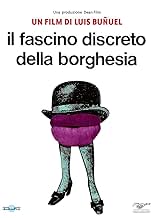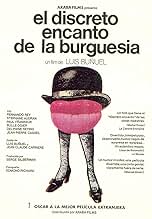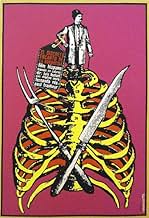Der diskrete Charme der Bourgeoisie
Originaltitel: Le charme discret de la bourgeoisie
IMDb-BEWERTUNG
7,7/10
49.497
IHRE BEWERTUNG
Eine surreale, praktisch handlungslose Reihe von Träumen rund um sechs Personen der Mittelklasse sowie deren ständig unterbrochenen Versuchen, ein gemeinsames Essen einzunehmen.Eine surreale, praktisch handlungslose Reihe von Träumen rund um sechs Personen der Mittelklasse sowie deren ständig unterbrochenen Versuchen, ein gemeinsames Essen einzunehmen.Eine surreale, praktisch handlungslose Reihe von Träumen rund um sechs Personen der Mittelklasse sowie deren ständig unterbrochenen Versuchen, ein gemeinsames Essen einzunehmen.
- Regie
- Drehbuch
- Hauptbesetzung
- 1 Oscar gewonnen
- 7 Gewinne & 9 Nominierungen insgesamt
Stéphane Audran
- Alice Sénéchal
- (as Stephane Audran)
Empfohlene Bewertungen
The systematic analysis of this film would be in my opinion a gigantic task, since there are so many topics, stories and references intermingled in the chaotic way the surrealists are so fond of. I think the two main topics -sometimes in surrealism there is not even one- are dreams and transgression of social norms and traditions. The film is articulated on linked-up situations: five gatherings of a group of bourgeois friends and four stories, four dreams which are dreamt by different characters. The suppers are more common in the first part of the film, and the dreams on a second part, but they alternate with each other and with other episodes, like that of the terrorist girl. At the beginning things seem not to turn out good: right the first thing we see is the perplexity of the guests to M. Senechal house when they are told the supper was planned for the next day. 'But that is impossible', says Acosta, 'I couldn't have accepted, tomorrow I'm busy'. Contradiction with no explanation, right the same way as things happens in a dream, where we accept the reality of what we dream without explanations, even if it is impossible or contradictory with something else -dreams are the core of surrealism and of this film. This baffling beginning really impressed me. There is contradiction and kind of a difficulty to do things in every single detail in the next sequence: Mme and M Senechal are invited to dine out, but she has to change. The restaurant 'n'a pas l'air gai', and the door is locked. They knock and they are invited in. The owners have changed. There is no people and the prices are cheap. Everything is suspicious. And then the first punch of the story: the manager died that afternoon and the wake has been set in the dining room since the undertaker has not yet arrived. Of course, the bourgeois leave. This is the first reference to death, a constant theme either in surrealism, in dreams and in this film. It seems as if the whole film was a dream. Within the context things are logical and normal -or seem logical and normal- to the characters, and their reactions are 'contextually' logical too, but from the outside the stories in the film are as odd as any dream we can have. E.g., when Acosta shoots the terrorist girl from his window, or when the army appeared at M. Senechal's house, or even when the bishop tells M Senechal that he wants to be the family gardener. They are baffled, but they accept the things that happen, as we are baffled by or dreams but accept their logic when we are dreaming. Social transgression is based on a subtle but scorning parody of the bourgeois class and their customs and beliefs. The bourgeois are classy, and conceited: they show off their vain culinary knowledge every time they host a supper. M. Thevenot boasts that 'discreet charm' of the bourgeois when he subtly makes fun of the chauffeur: he does not know how to drink a Martini. Later on, Acosta cheats on Thevenot when he tells him that he has to show his wife the 'sursiks'. Thevenot does not know what that is, but he is an hypocrite not to say it. The bourgeois are also extremely fond of the lowest vices and they enjoy them gaily -I do not think, on the other side, that Buñuel is condemning them, but the hypocritical attitude of the bourgeoisie. Drug trafficking and consumption, lust, alcohol. The commentaries about the younger girl vomiting and dirty nails and her ignorance (the complex of Euclides, she says at some point) point out -and laugh at- the hypocrisy in the values of the middle-high classes. Also the Church and the Army are criticized. The Bishop, a main head of the Church, is humble -a extremely acid irony- but will mercilessly kill a poor man that will die anyway -that adds to the cruelty. The Bishop is also ignorant: he does not know where the Republic of Miranda is. The soldiers and officers smoke marihuana and praise it, they even are connoisseurs! -'Mexico or Congo?', the general asks, referring to the origins of the product.. The dreams come over mainly in the second part of the film. Both the two first of them are dreamt by soldiers. I really enjoyed them. In the first one I see a little bit of a reference of the life in Spain on the times when Buñuel was a kid -I do not know Buñuel's early life in Spain, but I presume there could be some autobiography. The looks of the parents of the young soldier, their clothes and the strict, militarist attitude of the father made me think of the Spanish family life in the turn of the century XIX to XX. I also liked the second dream. The dark and blurry street and house and the background noise make a great dreamy scene. In this dream, the soldier meets a dead friend. Then another friend comes over, and makes him realize that it is impossible. Sometimes in real dreams this happens too. Something happens and then, with no explanation, we realize that is impossible. It also should be pointed out that these two dreams share two primal human topics: motherly feelings and fear to death. The topic of death is present in some other dreams: the general's, in which Acosta shoots him dead; or the dream about the ghost of the sergeant. Another primal fear is dealt with in Senechal's dream: shame. They are caught in a theater stage while they are having dinner -this is a recurrent dream that sometimes takes other forms: being naked in the middle of the street or lying on your bed wearing you pajamas in your classroom. I also found humor all over the film: funny situations such as the bishop offering himself as a gardener, or the straws in M. and Mme. Senechal hair. Acosta playing tricks on Thevenot, or the soldiers happily smoking joints and listening to a 'sympa' dream. But I do not know if Buñuel is trying to be funny or only to transgress. And that transgression is hilarious because it reveals the hypocrisy of society.
I am surprised that nobody recognized what the author wanted to say with this movie. The whole movie (except the last few minutes) is a dream of one ordinary man. He probably went to sleep without having dinner, and in his dream he pass through various situations where he and his friends intend to eat. But, they were interrupted every time, and he did not manage to have his meal at all. The reasons are every time stranger and stranger. Finally he woke up, goes to the kitchen and took from his refrigerator everything he find's. In one sentence, this movie is about our lust for eating. Simple, but extraordinary.
I'll be honest, I mostly like my movies to be conventional which simply means to me that they should have a beginning, middle and ending, plus a credible plot and believable characters. I've never cottoned on to the cinema of the surreal or the absurd and have always thought you can keep all that Coen Brothers or Pedro Almodovar stuff away from my door.
But, I live in Spain now and I have a learned Spanish neighbour who has encouraged me to watch some Spanish cinema particularly the films of Bunuel and so a few months ago I made a point of watching his earlier work "Viridiana" which I very much enjoyed and deciding to dip into his repertoire again, selected this particular movie, even if it was produced in France, as it seems to be his best known and perhaps most celebrated work. So glad I did.
Did I perceive every nuance of the director's intentions? Probably not. Did I understand the bigger arguments he was making, which to be fair is pretty much all there in the title? I think so though I can't be sure. Was I kept watching all the way through down to the delicious combination of intrigue, amusement and curiosity? Absolutely!
The narrative is simple. Three male-female couples want to sit down to dinner in modern-day France. The males are all in some way connected to the governance of an imaginary French protectorate in South America called Miranda with the most prominent among them being Fernando Rey as the country's ambassador, but all six are of the distinctly upper class set.
But don't be fooled into thinking that these suited and booted individuals are pillars of society. Far from it. As well as apparently having designs on each other's wives we also see that the three men are involved in the illegal trafficking of heroin.
It seems that every time they sit down to eat, an ever more bizarre outside intervention takes place before they can put the food to their lips. Much later Bunuel interjects into the narrative the dreams of a young French army officer who just happens along and then the daydreams of the lead characters themselves some of which in fact overlap the dreams of the others. Some of these are eerie, while others are comical.
If pushed, yes I can see the film attacking the governing elite, here shown as corrupt and without morals, but it's more the individual scenes that stay in the memory such as the shocking sequence when the local bishop, who joins the group, oddly enough as a gardener, later cold-bloodedly shoots dead an already dying man after he learns that years ago the man was the never-caught killer of his own parents or when the six are slaughtered Romanov-style by presumably Miranda freedom-fighters near the end.
But I also love the comic touches like when the group discover themselves playing themselves on stage in front of a baying audience, or when an important telephone conversation is drowned out by the sound of aircraft flying overhead in an almost Woody Allen-type moment. The funniest of many in the film for me was the sight of Ray's character giving himself away to the Miranda assassins by reaching up to the table under which he is concealed for a piece of duck he's waited all movie-long to taste.
Listen, don't ask me to write an essay on this film. All I know is that I found it very original, entertaining and funny in equal measure. A moveable feast in fact.
But, I live in Spain now and I have a learned Spanish neighbour who has encouraged me to watch some Spanish cinema particularly the films of Bunuel and so a few months ago I made a point of watching his earlier work "Viridiana" which I very much enjoyed and deciding to dip into his repertoire again, selected this particular movie, even if it was produced in France, as it seems to be his best known and perhaps most celebrated work. So glad I did.
Did I perceive every nuance of the director's intentions? Probably not. Did I understand the bigger arguments he was making, which to be fair is pretty much all there in the title? I think so though I can't be sure. Was I kept watching all the way through down to the delicious combination of intrigue, amusement and curiosity? Absolutely!
The narrative is simple. Three male-female couples want to sit down to dinner in modern-day France. The males are all in some way connected to the governance of an imaginary French protectorate in South America called Miranda with the most prominent among them being Fernando Rey as the country's ambassador, but all six are of the distinctly upper class set.
But don't be fooled into thinking that these suited and booted individuals are pillars of society. Far from it. As well as apparently having designs on each other's wives we also see that the three men are involved in the illegal trafficking of heroin.
It seems that every time they sit down to eat, an ever more bizarre outside intervention takes place before they can put the food to their lips. Much later Bunuel interjects into the narrative the dreams of a young French army officer who just happens along and then the daydreams of the lead characters themselves some of which in fact overlap the dreams of the others. Some of these are eerie, while others are comical.
If pushed, yes I can see the film attacking the governing elite, here shown as corrupt and without morals, but it's more the individual scenes that stay in the memory such as the shocking sequence when the local bishop, who joins the group, oddly enough as a gardener, later cold-bloodedly shoots dead an already dying man after he learns that years ago the man was the never-caught killer of his own parents or when the six are slaughtered Romanov-style by presumably Miranda freedom-fighters near the end.
But I also love the comic touches like when the group discover themselves playing themselves on stage in front of a baying audience, or when an important telephone conversation is drowned out by the sound of aircraft flying overhead in an almost Woody Allen-type moment. The funniest of many in the film for me was the sight of Ray's character giving himself away to the Miranda assassins by reaching up to the table under which he is concealed for a piece of duck he's waited all movie-long to taste.
Listen, don't ask me to write an essay on this film. All I know is that I found it very original, entertaining and funny in equal measure. A moveable feast in fact.
La Charme Discret de la Bourgeoisie is a celebrated film by a well-regarded surrealist auteur. Given that, and given my taste for such things, I went in with high hopes. But I rarely found it more than mildly amusing.
It's undeniably clever. Bunuel's dry humor sparkles, and his gentle social critique hits its marks more often than not. The penultimate shot of Fernando Rey with a slice of ham stuffed in his mouth is one of the funniest and most memorable cinematic images I've encountered in quite a while. And Delphine Seyrig breezes through her scenes with hilariously blithe detachment. But the parts don't quite add up to a greater whole.
The film reaches its peak about halfway through, once a pattern has been established (dinner parties will be attended, but dining will be teasingly withheld) and the central narrative has begun to digress and fragment. As the surreal intrudes upon the quotidian, a delicious sort of suspense sets in. Pity, then, that the last forty-five minutes squander this tension, retreating to tepid farce and a rather obvious critique of upper-crust social mores.
Someone on the film's board once quoted the director as saying, "the bourgeois moral is the immoral thing for me, that which should be combated; the moral founded in our unjust social institutions as the religion, the homeland, the family, the culture, in short, the so-called pillars of the society." Thematically, the film consists of variations on this familiar counter-cultural conceit, and such thinking was certainly voguish in the late 60s and early 70s. It's an interesting and potentially valid argument, but I found the film's handling of the idea superficial, even clichéd.
The same could be said, I suppose, of El Topo or Sweet Movie, but those films transcend glib adherence to fashionable ideologies and period style. I don't think La Charme Discret does that. Of course, it's more an urbane, low-key comedy of manners than a flaming art-bomb thrown through the window of middlebrow complacency, so perhaps the comparison is unfair. As a comedy, it is appealing, in a mild sort of way.
Finally, I was disappointed by the film's look. I understand that the bland stage-set dining rooms are a device, and a successful one. But surreal detours aside, there isn't much to look at. The camera placements and movements are almost ploddingly ordinary, and while they capture the events adequately, they don't do anything interesting with them.
I'm being unkind, of course, and terribly unfair. By stressing these complaints, I'm giving short shrift the wonderful performances and amusingly understated comic dialog. I'm overlooking the fabulously eerie dream sequences and Bunuel's masterful control of tone. I gave La Charme Discret a 7/10 because it IS charming, funny and somewhat intellectually intriguing. But I still came out of the experience feeling a bit let down...
It's undeniably clever. Bunuel's dry humor sparkles, and his gentle social critique hits its marks more often than not. The penultimate shot of Fernando Rey with a slice of ham stuffed in his mouth is one of the funniest and most memorable cinematic images I've encountered in quite a while. And Delphine Seyrig breezes through her scenes with hilariously blithe detachment. But the parts don't quite add up to a greater whole.
The film reaches its peak about halfway through, once a pattern has been established (dinner parties will be attended, but dining will be teasingly withheld) and the central narrative has begun to digress and fragment. As the surreal intrudes upon the quotidian, a delicious sort of suspense sets in. Pity, then, that the last forty-five minutes squander this tension, retreating to tepid farce and a rather obvious critique of upper-crust social mores.
Someone on the film's board once quoted the director as saying, "the bourgeois moral is the immoral thing for me, that which should be combated; the moral founded in our unjust social institutions as the religion, the homeland, the family, the culture, in short, the so-called pillars of the society." Thematically, the film consists of variations on this familiar counter-cultural conceit, and such thinking was certainly voguish in the late 60s and early 70s. It's an interesting and potentially valid argument, but I found the film's handling of the idea superficial, even clichéd.
The same could be said, I suppose, of El Topo or Sweet Movie, but those films transcend glib adherence to fashionable ideologies and period style. I don't think La Charme Discret does that. Of course, it's more an urbane, low-key comedy of manners than a flaming art-bomb thrown through the window of middlebrow complacency, so perhaps the comparison is unfair. As a comedy, it is appealing, in a mild sort of way.
Finally, I was disappointed by the film's look. I understand that the bland stage-set dining rooms are a device, and a successful one. But surreal detours aside, there isn't much to look at. The camera placements and movements are almost ploddingly ordinary, and while they capture the events adequately, they don't do anything interesting with them.
I'm being unkind, of course, and terribly unfair. By stressing these complaints, I'm giving short shrift the wonderful performances and amusingly understated comic dialog. I'm overlooking the fabulously eerie dream sequences and Bunuel's masterful control of tone. I gave La Charme Discret a 7/10 because it IS charming, funny and somewhat intellectually intriguing. But I still came out of the experience feeling a bit let down...
There are not many artists who could tell the same joke over and over again and get away with it creating the film as brilliant, funny, absurd, witty, and clever as Buñuel's "The Discreet Charm of the Bourgeoisie", 1972. The story of six friends who try to arrange and have a nice dinner together but cannot complete (or even start) their meal does not sound very exiting but wait until you watch this comedy. I've always known how interesting surrealism is but I never thought how funny it could be. I've seen the film four or five times - it only gets better with each viewing. Highly recommended.
9.5/10.
9.5/10.
Wusstest du schon
- WissenswertesThe movie includes three of Luis Buñuel's recurring dreams: a dream of being on stage and forgetting his lines, a dream of meeting his dead cousin in the street and following him into a house full of cobwebs, and a dream of waking up to see his dead parents staring at him.
- PatzerAfter Rafael gives the terrorist champagne, his position in the chair changes between shots.
- Zitate
Rafael Acosta: You're much better suited for making love than for making war. Vamos, muchacha. Vamos.
- VerbindungenFeatured in Pour le cinéma: Folge vom 16. September 1972 (1972)
Top-Auswahl
Melde dich zum Bewerten an und greife auf die Watchlist für personalisierte Empfehlungen zu.
- How long is The Discreet Charm of the Bourgeoisie?Powered by Alexa
Details
- Erscheinungsdatum
- Herkunftsländer
- Offizieller Standort
- Sprachen
- Auch bekannt als
- El discreto encanto de la burguesía
- Drehorte
- Produktionsfirma
- Weitere beteiligte Unternehmen bei IMDbPro anzeigen
Box Office
- Budget
- 800.000 $ (geschätzt)
- Bruttoertrag in den USA und Kanada
- 82.471 $
- Eröffnungswochenende in den USA und in Kanada
- 6.075 $
- 26. Juni 2022
- Weltweiter Bruttoertrag
- 103.230 $
Zu dieser Seite beitragen
Bearbeitung vorschlagen oder fehlenden Inhalt hinzufügen

























